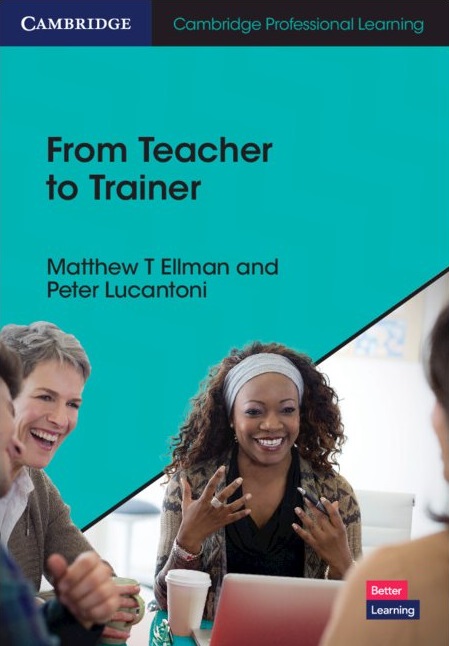
From Teacher to Trainer
By Matthew T. Ellman and Peter Lucantoni
Cambridge, 2022
ISBN: 978-1-108-82707-2
Since they often make bold claims as to how they have moved forward in this aspect of the ELT profession, it’s always interesting to review titles on language teacher education and training.
In their introduction to the title under review here, the authors state ‘…there is a lack of practical help available to experienced teachers who hope to take on more of a training role’ (page 1). I can’t help but think this is only partly true; flicking through the reference section reveals several well-known titles that have certainly helped me (and no doubt many others) with our training in recent decades.
A unique feature of this title, however, is access via QR code to ‘Trainer Voices’, which are short video clips of highly regarded trainers, such as Scott Thornbury, explaining how he started life as a trainer. It’s also possible to hear the thoughts of others on the differences between pre- and in-service teacher training, along with planning and adapting sessions to the institutional context. Ending each chapter in the ‘Find out More’ slot are references to key texts. One I would recommend is Craig Thaine’s ‘Teacher Training Essentials’. His ready-made training sessions have proved a life-saver for me – and again, probably many others – on several occasions down the years!
A further noteworthy feature of this title is the many references to research evidence supporting their claims. No-one these days would disagree with the authors’ statement on page 3: ‘There is a growing body of research literature on teacher training and how teachers learn, and we feel that it is important new trainers are introduced to it.’ Studies by ELT wise-owls such as Rod Ellis on second language acquisition, Zoltan Dörnyei on motivation, and Thomas Farrell on models of teacher education are just a few of these.
What this title does not do is provide the content of a teacher training course. Instead, it deals with the process of becoming a trainer and what this involves. Chapters One and Two introduce the theoretical background and its related concepts, including how to design sessions based on the three Ps model – practical, personal and professional – and then (hopefully) successfully delivering them.
While the previous chapters looked in detail at dealing with groups of teachers, chapters Five to Eight cover mentoring and observing individual teachers and providing feedback on their teaching. As these activities are often fraught with hazard and may easily end in tears (usually the observee’s) when carried out by the untrained trainer, I was impressed with the depth of coverage the authors provide. Of particular interest is the table, on page 96, with Heron’s six categories of intervention on outlining a menu of options for trainers who find themselves in a mentoring situation.
Chapter Six covers the purpose of observation, what to do before and during observation, along with the challenges related to each. Inevitably, somewhere along the line teachers need to be assessed, which is the subject of the following chapter, covering the reasons and process for assessing, including how to assess the professional, practical and personal features of a trainee. In chapter Eight the authors state: ‘But of all the skills involved in training teachers, we would argue that delivering feedback is the most challenging’ (page 151), so it came as no surprise to see this was one of the longer chapters in this title. Clearly experienced in this area, the authors outline what is meant by feedback, how to prepare for and set up a feedback meeting and how to provide spoken and written feedback on teaching. Personally, I found this the most insightful chapter in this book.
The final two chapters focus on bringing everything together when planning programmes of training. Also covered is the professional development of the trainer, which includes getting participants’ feedback on training, keeping a journal, and possible career destinations, such as managing a team of trainers or working as a training consultant. This title is a valuable addition to the field of teacher education and training, and comes highly recommended.





